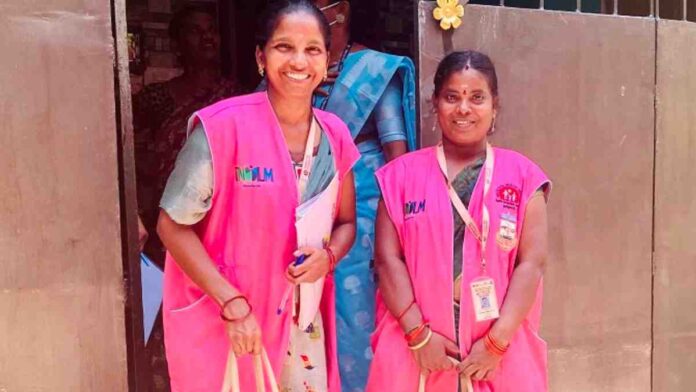Ms. V. Sasikala and Ms. H. Hemalatha are trained health volunteers, under the Makkalai Thedi Maruthuvam (MTM) project, who visit 25 households to provide primary healthcare directly at peoples’ doorsteps. They also assess the compliance of at least 20 beneficiaries daily who get medication for chronic disorders.
Every morning, Ms. V. Sasikala and Ms. H. Hemalatha dress in bright pink jackets and fill their biodegradable jute bags with diagnostic tools and medications to visit 25 households to provide primary healthcare directly at peoples’ doorsteps. Under the Makkalai Thedi Maruthuvam (MTM) project in Tamil Nadu, these women are trained health volunteers who make home visits to test persons over 30 for non-communicable diseases (NCDs), such as diabetes, hypertension, mental health problems, tuberculosis (TB), nutrition, and others.
Additionally, for the best illness management and treatment, they assess the compliance of at least 20 beneficiaries daily who get medication for chronic disorders.
Ms. Vanitha is one of the tens of thousands of people in Chennai that benefit from the MTM program. She receives routine medical attention and therapy without leaving her house in Makkaram Thottam in Kolathur, Chennai, despite having high blood pressure and diabetes.
When Ms. V. Sasikala and Ms. H. Hemalatha visit her at home, they take her blood pressure and blood sugar readings, record them, give her her monthly prescription medication dose, and ask her a series of health-related questions about her symptoms, nutrition, sleep, and mental health. They also check her 39-year-old son, Mr. Murali Mohan, who has not been diagnosed with an illness but is eligible for screening for NCDs due to his advanced age.
To provide patients a thorough continuum of treatment, services for the management of NCDs, TB, undernutrition, and mental health have been integrated. Diabetes increases TB risk and negatively affects TB treatment results. At the Urban Primary Health Centre (UPHC), women health volunteers take sputum samples from symptomatic patients in order to test for TB.
They also do blood pressure, diabetes, and mental health screenings. Sputum testing for TB is available in all UPHC diagnostics labs, and the results are available the next day.
Global statistics show that diabetes is linked to a two- to three-fold increased risk of TB illness, a two- to four-fold increased risk of TB recurrence after treatment is finished, and a two- to three-fold increased risk of TB that is multidrug resistant. Global Tuberculosis Report 2021 estimates that 370 000 new cases of TB were caused by diabetes in the world in 2020.
Establishing systems for cooperation, identification, and management of TB in patients with diabetes is advised by the WHO Collaborative Framework for Care and Control of TB and Diabetes.
The frontline of this partnership is made up of MTM volunteers who have been trained by the Tamil Nadu Corporation for Development of Women. Tamil Nadu State Tuberculosis Cell has trained and rewarded these women health volunteers for active TB case detection, with each volunteer receiving Rs 500 for every positive TB case they assist in identifying, in order to strengthen community-based health services with integrated care for TB patients with comorbidities. Additionally, MTM volunteers provide patients with guidance and encouragement to pursue the full course of TB therapy, which was lost-to-follow-up throughout treatment.
People who have been screened by MTM volunteers are offered diagnostic and treatment services by all 140 UPHCs in the Greater Chennai Corporation region. Two probable TB cases discovered by Ms. Kanchana, a woman health volunteer, have tested positive and are currently undergoing treatment for six months at the Thiru. Vi. Ka Nagar Urban Primary Health Center under the guidance of the medical personnel.
“All TB cases are reported, and each patient receives a monthly check-up. Women health volunteers collect sputum from symptomatic individuals for testing. Sanitation inspectors, who visit 80 homes daily to hunt for mosquito breeding grounds, also exchange a list of “irregular patients” for follow-up. Since we have included other sectors, the loss due to follow-up has significantly decreased. As the organization in charge of the Chennai TB Free Project, Dr. Lavanya J., the district TB officer for Greater Chennai Corporation, put it, “We don’t work in silos.
UPHCs offer their client populations specialized medical services as well. Every day from 4 to 8 p.m., experts in general medicine (internist), psychiatry, palliative care, ENT, nephrology, ophthalmology, dermatology, paediatrics, and obstetrics and gynecology offer polyclinics on various specialties. The community’s response has been excellent, according to Dr. Jaya Priyanka, medical officer of Kolathur UPHC in Chennai.
Using a multi-pronged strategy that includes bringing decentralized screening and treatment services closer to the community through Integration with Ayushman Bharat – Health and Wellness Centers, India’s National Strategic Plan for TB Elimination has the goal of ending TB by 2025, five years ahead of the global targets. The Ministry of Health & Family Welfare receives technical and operational support from WHO India to help speed up efforts to eliminate TB.



